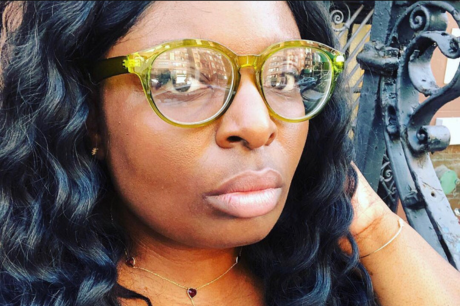In Their Own Words
Omotara James on “Rufus, I never met you, but I want to tell you”

Rufus, I never met you, but I want to tell you
For Rufus Wainright
this cup
(you can’t see it)
could be my brother
or my sister
it’s empty
but you can still see the ring inside
the height
to which a thing within its walls could rise
before leaking
out the bottom
you have two choices:
to believe nothing
or everything I tell you
did I have a choice
when a stranger
the Bible tells me is my brother
picked me up
with a sweet smile and clammy palms
to drink me
tell me yes and I’ll sing Hallelujah
pick up that cup over there
(one with the smears’ could be my sister)
and smash her
From Song of My Softening (Alice James Books, 2024). Reprinted with the permission of the poet and publisher.
On “Rufus, I never met you, but I want to tell you”
Rufus Wainwright is a friend of mine. Well, he's a friend of my mind.
When I state that my poems are informed by music, I’m alluding to more than melody. Music is an ancient spiritual technology that teaches me how and where I’m connected to the earth. I understand myself in relation to all that surrounds me. When I hear a song, I am reminded of the larger world. When I sing a song, I remember my place inside of it. My relationship to music can be defined by this Toni Morrison quote from Beloved: “She is a friend of my mind. She gather me, man. The pieces I am, she gather them and give them back to me in all the right order.”
The gesture of this poem is to convince someone I’ve never met of something they’ll never be able to corroborate: a wounding. The speaker is asking for a measure of faith, yes, but implicit to her demand of faith is a demonstration of it. She has a faith in Rufus, that goes unexplained, but underpins the entire poem.
It's not unusual that I write while or after listening to music, even if it’s a melody that I’ve composed myself. At one point, I might have referred to myself as an audiophile, but these days, I’m rediscovering and more deeply interrogating the music of my personal ethos. There’s something to be said for looking more closely.
The symbol of the cup is universally linked with human experience. In terms of ancient technologies, both the cup and music are vessels for social interaction. Both are associated with celebration and harvest. Cups are closely implicated in the context of cultural rituals, spells, and religions. Not only do they represent symbols of nurturing, they are social objects derived from social currency and wealth. The phrases “drink from my cup” and “share a cup” connote community. Contemporarily the phrase “grab a cup of” is everyday parlance. With specific reference to the poetry and literature of old English, when we look at Beowulf, for instance, the cup is used as a metaphor for both triumph and, ultimately, elegy. The ethos of the cup ranges widely. Personally, I’ve always found inspiration and comfort in the symbol of the cup. I collect striking cups and take as much joy in seeing an assortment of cups adorn a table as I might a bouquet of flowers.
When I first drafted this poem, I’d recently performed in my university’s rendition of the Vagina Monologues. The spirit of confrontation and the awareness of an audience filtered into the crafting of this poem. Indeed, I imagined the speaker on a stage performing this piece like a monologue, and perhaps Rufus was seated somewhere in the audience listening to her. The thing about the dramatic monologue is that it's counterintuitively lyrical. The trick of the monologue is to perform it in a way in which the audience who is obviously being performed for doesn't feel like they are witnessing a performance, but rather they are witness to a secret or they are being let in on a secret, and both the performer and the audience arrive together at the revelation. The revelation of this poem is a violation and a trauma, but this poem does not enter this violation, rather the poem is a gesture of defiance. The speaker takes the stage in an attempt to reconcile the world before with the world after.
There was a point in the mid-2000s when Rufus Wainwright and Tori Amos were in high rotation on my playlists. In particular, I had an affinity for the song, Hallelujah, by Rufus Wainwright. He is not the originator of the song, there's also a very popular Jeff Buckley cover of it, and folx can quarrel over which one is the better cover, but Leonard Cohen wrote and first performed it. I have competing affections for all three renditions, but Rufus’ version inhabits me in a particular fashion. The Leonard Cohen version is high 70s in style, more vocalizing than singing, and of course, there's a choir. The Jeff Buckley version is high art. It’s almost too beautiful, considering the amount of pain it carries. Rufus’ cover is the version you can listen to as you do the laundry, walk around the city and do errands. There’s a portable, mundane quality to his knowing, so it’s the version you live inside the most. Buckley’s version is the version you dress for and listen to in your best dress shoes.
Firsts are important. They open doors and leave a mark. Your first poetry acceptance. Your first love. The first time someone hits you. Your first divorce. Your first pandemic. Maybe because Rufus’ Hallelujah was the first version I heard, I imprinted on it and on Rufus. It wasn’t Stendhal’s syndrome, but close. I wanted to know more about Wainwright’s artistic life and influences and discovered a 2003 Guardian interview in which he discussed being sexually assaulted by a stranger while he was a teenager. I was not far from teenagedom when I was assaulted, and knowing that we both shared this experience, a shared cup, knowing that neither one of us reported it, while doing our best to carry on and create art, this meant something to me, something that I would carry like a dog and place squarely in my debut collection of poems.
Perhaps I’m always responding ekphrastically. I take the work of other artists quite seriously. The Rufus… poem is from the first part of the collection, titled the Sacrifice. The second part of the collection is titled Feast. Roger Ebert very astutely said in his movie, Life Itself, that you don’t leave this life with everything you came into it. Many of the poems at the beginning of this book are written for the parts of childhood that we are forced to leave behind. In life there are experiences or occurrences that might set one on a path toward annihilation, toward discovery.
What I love about Greek tragedies is that if you deeply consider them, they are highly interior works, but how we come to understand the interiority of the protagonists is by understanding how they are contextualized in the larger framework of their communities: family, traditions, religions, and laws. This understanding creates and bestows a real authority onto the storyteller, which is what I attempt to do with the storytelling of my debut collection. I reach into the ethos that made me a storyteller to contextualize the interiority of the speaker. My speaker inherited a legacy of traditions, values, and laws borne out of white supremacy and the world of the patriarchy. My speaker lives to speak back to this oppression, still.
There are experiences that beg for metaphor and not for simile, because some experiences require no conversion. Expanding their reach into a simile would do more harm than good. These are the occurrences that call out to be transformed: the way we see people transformed into animals in Greek myths, but as the storyteller, I could not do to an animal, what was done to me, not even within the context of this poem. The gesture of this poem is not to inflict more cruelty, but to assign comfort, the sort you get from a piping hot cuppa tea, even when it burns you.



